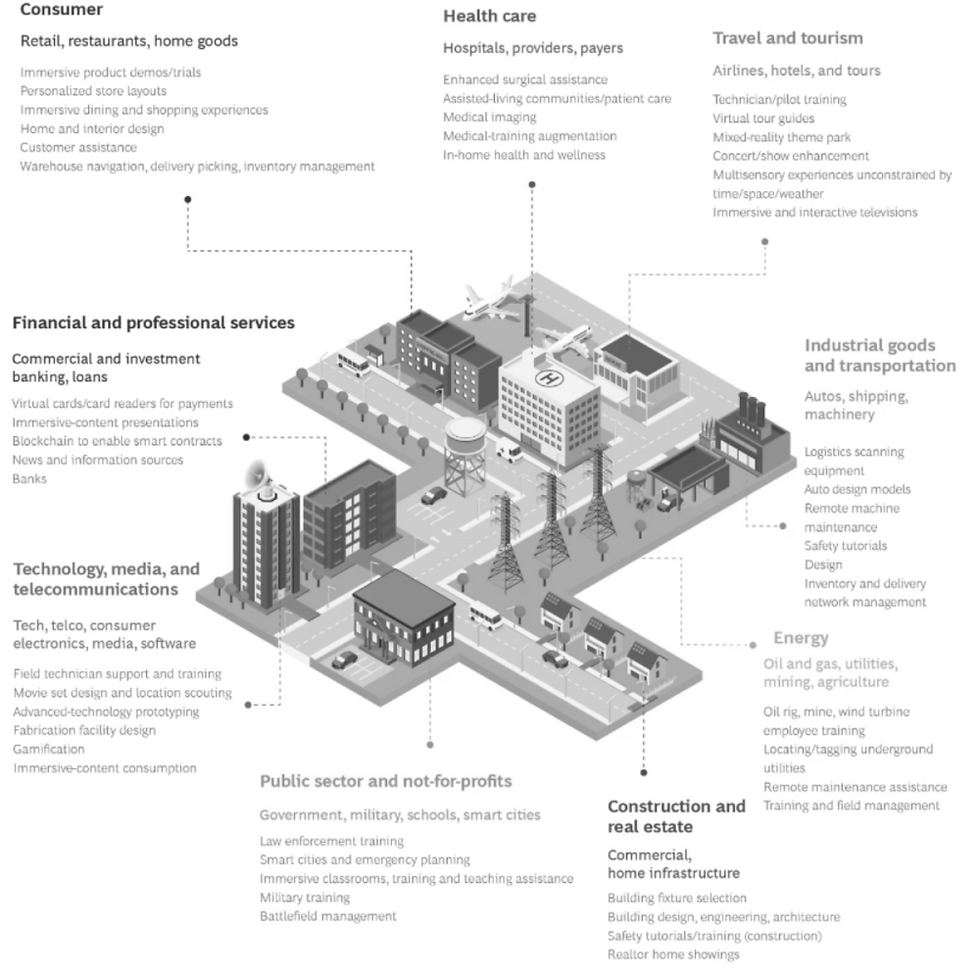What is Metaverse?
The metaverse concept is essentially a parallel, augmented universe and the digital twin of the real world. The metaverse is the virtual space where people, represented by three-dimensional representations, can immersively interact with the environment and each other. It is also poised to reshape workplaces and businesses by using new techniques to streamline operations. It's the cutting edge of human-computer interface development, with the goal of producing a fully integrated, all-encompassing, immersive, touchable simulation that's nearly identical to the real world.
Global efforts to speed up the metaverse development are kicking off. The metaverse is projected to contribute about $15 billion to GCC economies annually by 2030, led by Saudi Arabia and the UAE, as governments continue to introduce measures to tap into the potential of emerging technology. Saudi Arabia is expected to dominate with a $7.6bn contribution and the UAE will follow with $3.3bn says Strategy& Middle East, part of the PwC network. The technology is seen as an economic opportunity worth between $8 trillion and $13 trillion, heavily dependent on how much companies are willing to invest in the emerging innovation, PwC said.
Is the Kingdom of Saudi Arabia ready to leverage opportunities offered by Metaverse?
Saudi Arabia, the Arab world's biggest economy, is in the middle of a significant economic diversification drive under its Vision 2030 agenda, with technology a key pillar to attract investments and create jobs. The Kingdom has made an enormous investment in the metaverse: The $1 billion funding of XVRS is part of a larger $64 billion in future technologies which are expected to accelerate the country’s digital transformation. Coupled with the youthful age of Saudi Arabia’s population, this means that the stage is set for a smooth adoption.
With 65% of Saudi Arabia’s population under 35 years old, mostly living in urban areas and highly educated, a factual statement to believe that the Kingdom will become a trailblazing metaverse hub.
Metaverse | What does it mean for businesses?
The economic impact of metaverse will affect business, commerce, planning, design, construction, shopping, recreation, transportation, tourism and daily life. The potential for the metaverse to invigorate and alter critical sectors in the GCC countries is considerable in a regional context.

If we think of the metaverse as a digital representation of the physical world organized into layers, similar to a technology stack, we can see how companies will participate at the different layers. Some will be active in the bottom layers, building the digital infrastructure, providing financing, and delivering connectivity or key services. Most, however, will focus on the top, app layer, where they will interact with users (either B2B or B2C) in metaverse environments. Much of the action to date has been in B2C, especially gaming and, increasingly, providing immersive virtual experiences, such as concerts. But B2B applications are catching up fast and may ultimately be where much of the business value is generated.

How is Saudi Arabia reaping benefits to leverage from this sector?
Saudi Arabia’s Virtual Black Stone Initiative now makes it possible for Muslims to virtually touch the Black Stone at the Kaaba.
NEOM, Saudi Arabia’s multi-billion-dollar futuristic city, have a digital twin in the “metaverse,” allowing people to live, work and play in the megacity. NEOM’s digital twins coming on board will also enable citizens to purchase property in XVRS. Moreover, the metaverse is being used to help build NEOM, to give architects, engineers, designers, and others a platform for working together and personalizing their work. The digital division of NEOM has developed a metaverse that enables users to exist in two places at once, either as a hologram or an avatar in the real world.
The Royal Commission for AlUla has officially entered the metaverse with an immersive 3D model of Hegra’s Tomb of Lihyan, son of Kuza, a UNESCO World Heritage site that will be accessible to virtual tourists. They can explore its unique features from anywhere in the world. Marking AlUla’s first-ever venture into the innovative digital realm and the first UNESCO World Heritage site in the metaverse, a trip to Hegra will be just as impressive, inspiring, and mesmerizing as in real life.
These are a few examples of how Saudi Arabia is bringing the virtual and real world together in ways that were unimaginable even a few years ago. With megacities scaling up to incorporate ‘metacities’, the writing on the wall is clear – the metaverse is going to change the way we live, interact, and conduct business. In fact, the metaverse is expected to be a “breakthrough” or “transformational” that will infiltrate every sector in the upcoming years, culminating in a variety of business opportunities such as virtual concerts, immersive entertainment and gaming, enhanced customer engagement, remote working, creative marketing, digital real estate and a lot more.
Ultimately, Saudi Arabia will have to tread with caution, being well aware of the risks and challenges, and simultaneously build mechanisms to address the issues. The reality is that Metaverse will soon become an embedded part of our lives which means that the sooner Saudi Arabia uncovers the challenges of the decentralized structure, the quicker it will be able to take the lead.
The solution for challenges posed by technology lies in the technology itself, hence being agile, aware, and adaptable while opening up a whole new virtual world for its citizens is the key for our government.

.png)
Comments